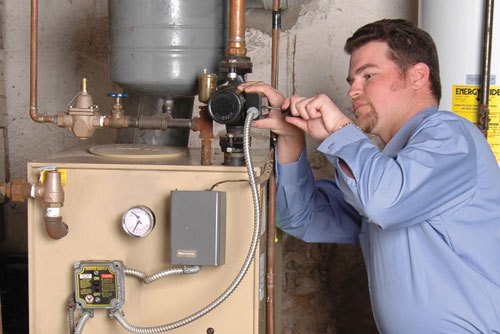 If your gas or oil-burning furnace or boiler was installed before the mid-90s, you are probably wasting 30% or more of your energy dollars in addition to pumping up to 4 tons of carbon dioxide into the atmosphere each year.
If your gas or oil-burning furnace or boiler was installed before the mid-90s, you are probably wasting 30% or more of your energy dollars in addition to pumping up to 4 tons of carbon dioxide into the atmosphere each year.
State-of-the-art oil boilers and furnaces are robust, dependable, durable, easy to maintain and repair, have many interchangeable parts, and best of all, have efficiency ratings at 95%. Modern oil heating systems in well-insulated homes now allow homeowners to achieve the same amount of warmth using 40% less fuel, further reducing emissions and lowering heating costs.
Advancement in equipment technologies has also diminished consumption over the past three decades. Using less fuel reduces your total bill and drastically decreases your impact on the environment.
When you upgrade your home heating system, you’ll do all of the following, and more!
Your heating system’s performance, efficiency and cost to run are all factors to consider when you’re thinking about upgrading. Asking yourself these questions can help you determine what will make the most sense for your home-heating future.
It’s normal for a heater to eventually need a new belt or a little love once a year to make sure everything is running properly, but a well-maintained heating unit should work without much mending along the way. Calling the service technician frequently for the same problem and/or needing several visits during the same heating season are indicators that the system may be past the point of no return. A general rule to remember: If annual repair costs reach 50 % of the present value of the heater, then it’s likely time to replace.
Are your energy bills higher than you remember them being? That may be a sign that some part of your heating system is weakening. Most companies can provide a residential energy audit, which can point to easily remedied inefficiencies like weather-stripping around doors and windows or attic insulation. It may also be the first step in determining if your heating unit is going out.
Heating units were never designed to last forever. The average life expectancy of an oilheat appliance is about 30 years when properly maintained, more than double that of the 11-to-14 years promised for natural gas furnaces. Keep in mind that many outdated furnaces operate at an efficiency of just 65% or less. Meanwhile, a replacement that’s been qualified with the Energy Star rating can be up to 30% more efficient.
Noises like squealing, jolting, clinking or banging could be signs of a mechanical problem. It could be something as simple as a worn belt, but it may mean an internal component of the unit has loosened or come completely separated. If noise pollution is an issue for you, that may be reason enough to upgrade to newer equipment, or at the least, look into the issue.
Other signs that it is time for an upgrade include temperature and comfort issues throughout your home on a regular basis, low humidity in your home and compromised air quality. Learn more about benefits for upgrading.